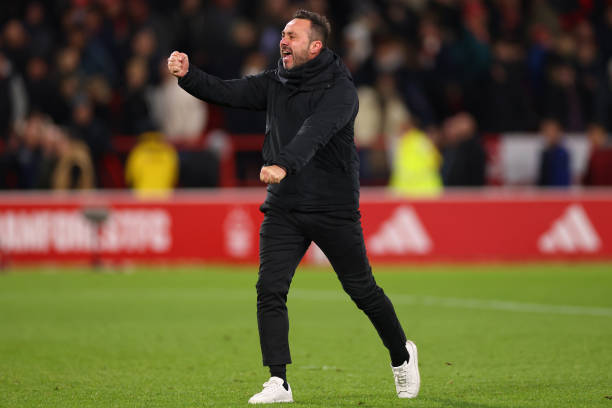The Evolution of Roberto De Zerbi’s Attacking Philosophy
In the world of coaching football, where people usually follow old ways, Roberto De Zerbi does things differently. He’s really good at making attacking strategies and doesn’t stick to the usual Italian coaching style.
Roberto De Zerbi, the mastermind behind Brighton’s thrilling attacking style, has carved a distinct niche among his Italian managerial counterparts, diverging from the traditional cautious approach associated with renowned figures like Claudio Ranieri and Carlo Ancelotti.
In an exclusive interview with TNT Sports, De Zerbi delved into the roots of his football philosophy, attributing it to his playing days and shedding light on his team’s evolution under his guidance.
The Italian manager, known for steering Brighton towards a dynamic, high-risk attacking style, shared the key divergence in his approach, drawing a connection between his history as a player and his managerial style. “Ancelotti was a midfielder, Ranieri was a defender, and I was a number 10,” De Zerbi highlighted. “So my idea is more attacking than the traditional Italian idea.”
This departure from the norm has been evident in Brighton’s gameplay, notably culminating in a sixth-place finish in the Premier League under De Zerbi’s tutelage last season.
However, the current campaign has seen the Seagulls falter slightly in the league, securing only one win since September and conceding goals at a higher rate compared to their previous season’s defensive solidity.
De Zerbi dissected the shift in tactics, attributing it to the departure of Alexis Mac Allister, a player who often operated as a pseudo-number 10 within their attacking quartet.
“We were playing with four attackers last season, but Mac Allister often played like a number 10,” De Zerbi explained. “So we had more control of the game.” The absence of such a player has led to a more direct approach from the current crop of attackers, fueling their desire to score when in possession.
Despite these challenges, De Zerbi remains optimistic and pinpointed Pascal Gross as a standout performer in Brighton’s campaign. Showering praise on Gross, De Zerbi highlighted the midfielder’s exceptional qualities, expressing confidence in Gross’s ability to thrive at an even higher level.
“Pascal is one of the best players I have worked with,” De Zerbi commended. “He can already play in the Champions League, in the first eleven of Germany. He is at the right level to fight for another level at Brighton.”
As Brighton prepares for their UEFA Europa League journey and navigates the complexities of the Premier League, De Zerbi’s innovative approach continues to captivate attention. His emphasis on attacking flair while acknowledging the need for adaptation in the face of squad changes exemplifies a manager keen on evolving strategies to suit the dynamics of modern football.
The Italian manager’s departure from the conventional mindset prevalent among his compatriots illustrates a broader trend in football philosophy—a willingness to challenge established norms and tailor strategies to suit the strengths and characteristics of the team at hand. De Zerbi’s reliance on his playing days as a guiding principle for his managerial style showcases the enduring influence of personal history in shaping a manager’s approach to the game.
In the ever-evolving landscape of football tactics and strategies, Roberto De Zerbi’s unique approach stands as a testament to the diversity of ideologies that shape the beautiful game.
As Brighton navigates the complexities of multiple competitions, the evolution of De Zerbi’s philosophy promises an exciting journey filled with attacking verve, adapting strategies, and a quest for success, offering a glimpse into the future of managerial innovation in football.
@Sportscliffs on Twitter and Instagram and also like our facebook page


